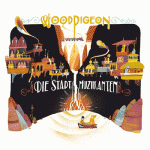Noise 101: CD Reviews for the Reflector Jan 28
Noise 101
Choice Cut
By Sean-Paul Boynton Arts Editor
People always say, “Never judge a book by its cover.” But when it comes to albums, sometimes looking at the cover and thinking about the title can be an appropriate jumping-off point for exploring the record’s depths. Obviously, something like a Britney Spears’ album is easy to analyze, considering it’s usually just her face and an easy-to-understand title like Circus
But here comes Spoon and their latest album, their seventh in 16 years. It’s called Transference, and it features a photograph of a young man slouching in a yellow armchair, looking bored or distracted, his eyes darting to the side. There’s clearly a party going on around him. What is he thinking about? Another party on the other side of town? Is his girl casually flirting with another guy? Did he leave the stove on?
The word “transference” is another matter, as it can be defined a few different ways. The most intriguing, and the one that can be used most readily here, is the instance in which a patient develops romantic feelings for his or her psychiatrist.
This situation is not one of real love, of course: the intimacy of in-depth analysis, of someone willingly probing into someone else’s feelings and desires, can be mistaken for a deeper connection.
If these feelings can be misconstrued so easily, then what is love, really, and how can it possibly be defined and discovered by a human being if it’s such a shape-shifting enigma? That, in a nutshell, is what transference – and as a result, Transference – is all about: finding true love while trying to figure out what the hell that love means. No wonder the boy is so distracted.
Britt Daniel, the songwriter, singer and guitarist for Spoon, has certainly mined this territory however abstractly over his career, but never in such an artfully concise manner as seen here. Throughout Transference, he remains distracted, nervous, jumpy, anxious, and altogether strung out as he explores the notion that maybe he’s had love before, and maybe he has it now, but how can he be so sure? As a songwriter, his modus operandi remains somewhat the same, as he works in the post-rock, catchy-pop-tune mode he has made a specialty. But as a lyricist, he’s a purposeful mess, darting from subject to subject like a moth to a flame.
“Written In Reverse” is the howling highlight, as Daniel screeches and barks over love lost, or maybe about to be lost. “I wanna show you how I love you but there’s nothing there” is perhaps one of the most horrifying lines written in the name of love, as it lays bare the male ethos of not being able to express oneself (not to mention the possibility we’ve all faced of mistaking love for something else).
The band creates a stuttering stomp that personifies this man, unable to share his feelings and unsure of what they even are, punching holes in his wall out of frustration.
Spoon, like the best rock bands throughout history, knows how to match the words with appropriate drama, and the fact that they’re considered one of the tightest outfits in the indie sphere helps them pull this off astoundingly. They’re also masters of using the studio to their advantage, and the way they mix low-fi mixes and crisp production flourishes is what makes Transference such an uneasy listen. The sonic tricks they do use are carefully chosen, softly implemented, and ultimately stimulating, like the way sung phrases cut off mid-syllable in the haunting “The Mystery Zone” and “Is Love Forever?”
Here’s a thought: what if love didn’t exist at all? Well, we’d certainly have less to talk, write and sing about. But if love is such a hardship, and the biggest gamble to undertake on the casino floor of life…well, isn’t that what Transference is all about? That our lives would be easier? The fact is, Transference is a snapshot of what we all go through when we deal with love: from time to time, it can be confusing, unreal, and frustrating, and we just want to scream at the top of our lungs for the room to stop spinning.
But then we calm down, take a breath, and realize that without love, there really isn’t anything to live for; that’s why we care so much to think about it so hard. Maybe Spoon’s next record will reflect this coming-down from panic. For now, though, we have the boy, alone, thinking, waiting, ready to burst. If this isn’t love as we ideally see it, then it’s definitely what love is to the common man, and for showing that through their music, Spoon should be applauded.
More tracks on the racks
Die Stadt Muzikanten is the kind of album to plug in when you want to do your homework with a cup of tea in hand and a blizzard outside. With Mark Hamilton’s restrained, calm lead vocals and the help of about 20 other musicians, DSM is an impassioned and charming collection of folk-pop. “Such a Lucky Girl” is a highlight, opening with sleepy flutes and squeaky guitar strings before building into a mellifluous love(ish) song. Overall, it’s a quiet album with plenty of pretty bits, best heard really loud in an otherwise quiet room.
—Zoey Duncan
The idea of putting Charlotte Gainsbourg together with Beck is an idea that is so perfect it’s a wonder why it didn’t happen any time sooner. Gainsbourg’s breathy vocals layer perfectly over Beck’s pop sensibilities. “Heaven Can Wait” is worth losing yourself into in a decent pair of headphones. Or download the video to your favourite music video player and replay it as many times as you want, discovering something new each time. The rest of album is equally complex. When Gainsbourg sings in “Le Chat Du CafŽ Des Artistes,” her voice becomes another instrument that weaves around the haunting melody.
—Selina Renfrow
OK Go’s third album takes its title from General A.J. Pleasonton’s The Influence of the Blue Ray of the Sunlight and of the Blue Colour of the Sky
. Never heard of it? It was published in 1856 and there isn’t even a Wikipedia entry on it. Whatever it’s about, it provides for an interesting CD cover and booklet. The disc itself is just as interesting and complex with each track crafted to take you along for a ride. Damian Kulash bleeds heartache and regret on the track “Skyscrapers,” while the drums carry you off on an adventure in “Back From Kathmandu.” Be prepared for a pleasant surprise.
—Selina Renfrow
Downloadables
Gorillaz “Stylo”
Damon Albarn is one busy man. Besides reuniting with Blur and contributing to numerous albums (see No. 3), he has also re-launched his second-most-famous musical project. These funky monkeys haven’t lost their touch for creative collaborations in the name of new-millennium trip-hop, as “Stylo” rides a comfortably pulsing beat that fans will immediately recognize despite its intriguing exhaustion, while Bobby Womack wails and Mos Def literally phones in a few lines of freestyle.
myspace.com/gorillaz
Phoenix “Sad-Eyed Lady of the Lowlands”
Some may be surprised by this dance-rock quartet tackling Bob Dylan’s stately shuffling epic, but consider the facts: the song was originally written for the Bard’s French wife; Phoenix is a French band; maybe there’s a deeper connection here? No matter. Although this live acoustic performance for German magazine Musikexpress isn’t as long as Dylan’s 11-minute performance, it’s still a satisfying snapshot of a skyrocketing, high-energy group dialing down the synths and warming our hearts.thetripwire.com
Massive Attack “Saturday Come Slow”
Over the past 12 years, this pioneering trip-hop act out of Bristol has struggled to reach the dizzying heights they set for themselves with their classic trilogy of albums released throughout the 1990s. This track from their forthcoming album comes closer than other recent efforts, thanks in no small part to an emotive vocal from Damon Albarn. The music is all slow build and full of creeping doom, but what else did you expect from Massive Attack?
stereogum.com









